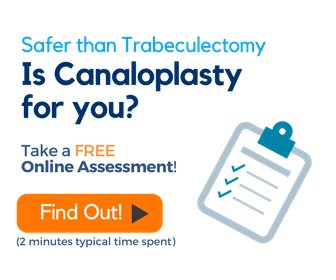Hello, I’m Dr. David Richardson. I’m an Ophthalmologist in Southern California and my practice is primarily glaucoma and cataract treatment.
So my first video began discussing holistic approach to glaucoma treatment taking into account things other than just IOP (intraocular pressure). In particular, I mentioned cardiovascular fitness and controlling high blood pressure. Well, as with most things in medicine it’s not so simple as just controlling your blood pressure. There are a few nuances that are important to know about in controlling your blood pressure, in terms of making sure that that’s beneficial to the treatment of your glaucoma.
So let’s take a little drive together and I’ll go over some of those nuances with you,
Blood Pressure, Perfusion and Your Eye
So, with blood pressure as with eye pressure, there’s a bit of a Goldilocks issue involved. You want to both lower the pressure but not too low. It is possible for both your eye pressure and your blood pressure to be too low. And today we’re going to, primarily, be talking about blood pressure and how that impacts the health of your optic nerve. And ultimately, that’s what you’re trying to do (with glaucoma) is maintain good optic nerve health.
So, the reason why blood pressure control is important in the treatment of glaucoma or actually with any organ system, whether it’s the optic nerve, the brain heart, the kidneys, is something called “perfusion”. Perfusion essentially describes the blood flow to a particular organ. You want organs to be adequately perfused; if they don’t get good blood supply, they don’t get good nutrition, they don’t get oxygenation and they can’t get rid of the metabolic waste products that have built up from these organs doing the things that they do. Now, with the optic nerve, you need to have adequate perfusion in order to keep the optic nerve, the retina…all of the associated tissues in the eye, healthy. And in order to have a good perfusion, the blood pressure–what’s called the systemic pressure, has to be adequate to provide blood into the optic nerve. Now, if the optic nerve is in an eye that has a high eye pressure, then the blood pressure is working against that eye pressure. so there’s a ratio that’s important, essentially a ratio of blood pressure to eye pressure. So, you might think, initially, “oh well the higher my blood pressure, the better that must be for my optic nerve then, right?” Well, not exactly because high blood pressure over time ends up causing damage to the arteries. And you end up with, oddly enough, reduced pressure to organs even though the overall blood pressure may be higher.
Nocturnal Dippers and Glaucoma
So, generally when somebody has high blood pressure or systemic hypertension, the treatment for that is to lower the blood pressure. So based on what we’ve already talked about (you can see) that could be an issue if you lower the blood pressure too much then organs such as the eye may not get adequate perfusion. Now, this is particularly an issue in those who are called “dippers”. Dippers are—and in particular, nocturnal dippers (nocturnal, meaning at night time)… Nocturnal dippers are those who have blood pressure that drops by greater than 10% at night when they’re sleeping. So, as you can imagine, that’s a significant amount, And if your blood pressure is already adequately controlled during the day and then it drops even further at night, that could be damaging to the optic nerve.
So, those who treat glaucoma, such as myself, generally recommend—for those who are taking systemic hypotensive therapy…so blood pressure medications, that as much as possible these medications be taken only in the morning or during the day because the risk is, if you take blood pressure medications at night, then that could actually result in blood pressure lowering that was too aggressive resulting in poor perfusion to the optic nerve.
Now this often goes against what the internist—the primary physicians or family physicians would prefer. And understandably, they’re primarily focused on the systemic issues. But in particular, there’s a recent study that came out that showed the use of a particular beta blocker—which is a type of blood pressure lowering medication, at night, can actually reduce the risk of developing diabetes,[1] Well diabetes is a very significant condition that we would like to avoid developing. So, understandably from the perspective of (again) holistic perspective of the whole body, it makes sense to try to avoid diabetes. But in those who have glaucoma, where you have a known risk or an existing condition, with a known risk of potentially blinding loss of vision, one must weigh the risks and benefits. And my general impression is that, for those who already have glaucoma the risk of developing additional loss of vision from systemic hypotension (blood pressure that’s too low at night) is simply too great. And whatever potential benefit there might be in terms of reducing the risk of developing diabetes is outweighed by the known risk of loss of vision in those who already have glaucoma.
Beta Blockers and Glaucoma
So speaking of beta blockers, I would like to address briefly an issue of topical beta blockers. Beta blockers work in the eye to lower eye pressure. So not only do they, when taken by mouth, lower systemic blood pressure but in the eye they’re very commonly used as eye drops to lower the eye pressure. Now it’s a small amount compared to what we take by mouth when trying to deal with systemic blood pressure but it’s possible even with just an eye drop to have the systemic side effects.
So what are some of the systemic side effects of beta blockers? Well we’ve already talked about 1) systemic hypotension-so a blood pressure that’s too low. Other side effects include things such as fatigue, low heart rate, even depression, and impotence.
So these drugs, which have been used in general quite safely for many, many, many years do have some issues that you have to be aware of. The one that is most relevant to the discussion that we’re having however is the issue of systemic hypotension. And it’s possible even with a topical beta blocker so the eye drop for the blood pressure to be reduced. And again, if that happens at night, that could be an issue with regard to the perfusion pressure of the optic nerve.
So, how does that relate to the use of topical beta-blockers (so eye drops in the treatment of glaucoma)? Well, generally, when I’m recommending that beta blockers be used as an eye drop to treat glaucoma, I recommend that they be used only in the morning. Traditionally, beta blockers have been prescribed—what we call, BID or twice twice a day dosing: morning and afternoon or morning and night. I now feel that the evening dosing is just not recommended. And the reason for that is—not only is there the risk of systemic hypotension (reducing the perfusion pressure to the optic nerve), but the effect of beta blockers on the intraocular pressure is really only available during the day. So they have almost no effect on eye pressure at night. So given that there’s almost no benefit to lowering eye pressure when the beta blockers are taken at night and given that there’s the potential for systemic hypotension– so lowering the blood pressure, reducing the perfusion pressure when even eye drop beta blockers articulate night, I see no reason why they should be taking the night. for those who are, say, on a fixed combination agent like cosopt which is a beta blocker and and a carbonic anhydrase inhibitor where they need to take these twice a day because the carbonic anhydrase inhibitors not work well enough just once a day –for those patients I recommend that they take these drops morning and early afternoon. in any case, no later than 4:00 p.m because after 4 p.m., you really are potentially in a trade-off situation where the risk of taking the drop from the perfusion pressure aspect outweighs the benefit the intraocular pressure lowering from the drop.
So, anyway, I’m hoping that this was of some benefit to you and if so I’ll keep doing it perhaps find a time of day or a route that involves less glare although time of day may be difficult. Anyway have a great day and I look forward to our next commute. Bye
References:
[1] Ramón C. Hermida, Diana E. Ayala, Artemio Mojón, José R. Fernández. Bedtime ingestion of hypertension medications reduces the risk of new-onset type 2 diabetes: a randomised controlled trial. Diabetologia, 2015; DOI: 10.1007/s00125-015-3749-7
Related Articles:
- Physical Activity and Rate of Visual Field Loss
- Holistic Approach to Glaucoma | Driving with Dr. David Richardson Ep 01
- Today’s Dietitian | Holistic Nutrition: Complementary Glaucoma Therapies
- My Guidelines to Initiating Glaucoma Supplement Therapy
- Glaucoma Supplements To Discontinue (Or Continue) Around The Time of Eye Surgery

David Richardson, MD
Medical Director, San Marino Eye
David Richardson, M.D. is recognized as one of the top cataract and glaucoma surgeons in the US and is among an elite group of glaucoma surgeons in the country performing the highly specialized canaloplasty procedure. Morever, Dr. Richardson is one of only a few surgeons in the greater Los Angeles area that performs MicroPulse P3™ "Cyclophotocoagulation" (MP3) glaucoma laser surgery. Dr. Richardson graduated Magna Cum Laude from the University of Southern California and earned his Medical Degree from Harvard Medical School. He completed his ophthalmology residency at the LAC+USC Medical Center/ Doheny Eye Institute. Dr. Richardson is also an Ambassador of Glaucoma Research Foundation.


